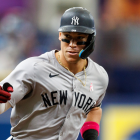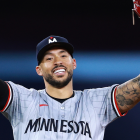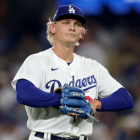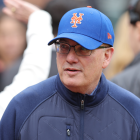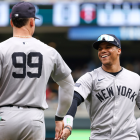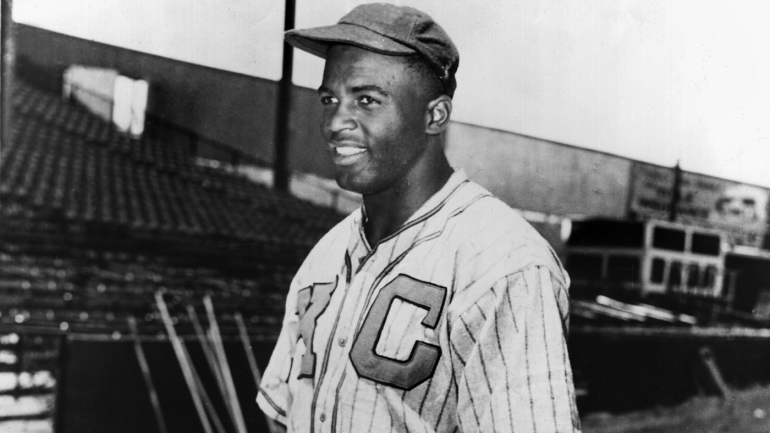
If not for that team, if not for that buccaneering league that housed them, would that scout -- that "white fellow," in the words of inquiring teammates -- ever have approached Jackie Robinson in late August of 1945 at Chicago's Comiskey Park? Would that scout have asked him to meet him in Toledo and then take the train east with him but in the meantime ask him to keep quiet about those plans? Would he have beseeched Robinson to please believe him when he told him why he was there?
"Jack," he said to him. "This could be the real thing."
Before -- but not long before -- Jackie Robinson was a Brooklyn Dodger or even a Montreal Royal, he was a Kansas City Monarch. Robinson's 34-game turn with the iconic Negro American League franchise in 1945, his first season as a professional baseball player, isn't exactly forgotten, but given his later pioneering and history-crafting, Robinson's Monarch days often get forsaken in discussions of his legacy. On the anniversary of his trailblazing debut, though, it is important to remember how we got to that April 15, 1947, MLB debut. And that story cannot be told without the Kansas City Monarchs of the Negro American League.
Although Robinson didn't debut for the Monarchs until he was 26, his sporting bona fides were never in doubt. He was a thriving four-sport athlete from high school to junior college then to UCLA, where he was the first to letter in four sports -- football, track, basketball and baseball. In football, he earned All-American laurels, and he likely would've been an Olympian had the 1940 Summer Games not been called off because of World War II.
Financial troubles forced Robinson to drop out of UCLA during his senior year in the spring of 1941, and a brief career in semi-pro football followed. Robinson also around this time received an informal and perhaps unserious tryout for the Chicago White Sox in Pasadena, but soon after he was pressed into military service in response to the bombing of Pearl Harbor. This put his athletic career on hold for roughly three years while he mostly served as a second lieutenant in the 761st Tank Battalion in Texas. In November 1944, Robinson prevailed in a court martial hearing resulting from his principled refusal to obey an order to sit at the back of a Foot Hood bus. Once vindicated, he was honorably discharged.
Prior to that discharge, Robinson at Camp Breckenridge in Kentucky, as the story goes, ran across a group of his fellow soldiers playing catch, and one of them -- possibly Ted Alexander, who had pitched sporadically in the Negro Leagues -- suggested that he request a tryout with the Monarchs. Robinson did that and was granted an audition the following spring. Another version of Robinson's Monarchs origin story has it that pitcher Hilton Smith in 1944 became his Negro League advocate after a brief discussion while Smith sat in a winter-league bullpen not far from Robinson's Pasadena home. Another has it that Smith saw Robinson play at Fort Hood and then urged the Monarchs to approach him. Which version is true, or whether there's some truth in all the versions, is somewhat obscured by history.
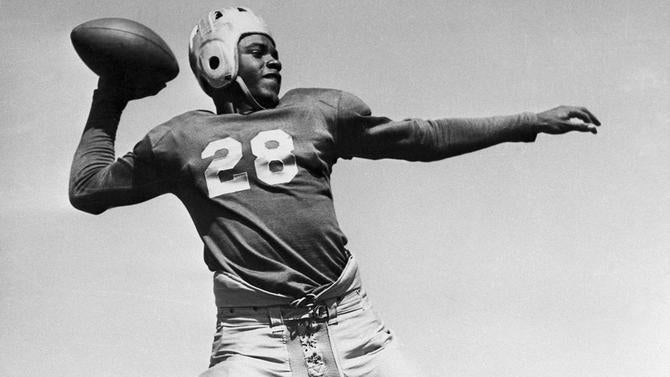
Robinson at UCLA and afterward seemed to carry more promise as a football player (or a "gridster," as one Kansas City Call reporter referred to him). Indeed, his lone season of college baseball occasioned struggles. That plus the long layoff from organized sports likely conspired to make him a bit of a long shot with one of the Negro Leagues' strongest teams. However, Robinson's tryout was good enough to get a spot in the Monarchs' infield for the 1945 season under manager Frank Duncan. He would make $400 a month. Had the Monarchs been at full strength -- the imposing likes of Buck O'Neil, Hank Thompson, Willard Brown and Ted Strong were still serving in the military in 1945 -- Robinson would not have made the roster. Things as they were, though, the Monarchs had a need, and Robinson had an aptitude.
At the time, Robinson was coaching basketball at small Samuel Huston College in Austin, Texas, and his obligations didn't permit him to report to spring training in Houston until camp had been underway for a week and with just a couple of days remaining before the Monarchs' extensive exhibition schedule began. He reported on Friday, lost a chance to get in some sorely needed reps on Saturday because of rain, and then showed up to the Monarch's first game on Sunday. Robinson filled a utility role at first, but after shortstop Jesse Williams suffered an injury, he took over as the regular at that critical position despite a throwing arm that seemed ill-suited to making heaves from deep in the hole. Robinson claimed the vital role despite the fact that most of his teammates had played winter ball in Latin America and thus were much closer to being ready for game action. Nevertheless, Robinson kept working to revive his surely in-repose baseball skills in spring tilts that took Robinson and the Monarchs all across Texas and then into Alabama and Georgia.
In April, Robinson took a break from the team in order to travel to Boston. He did so at the urging of legendary Black sportswriter Wendell Smith, who along with Boston city councilman Isadore Muchnick had pressed the pitifully reluctant Red Sox into granting a tryout to three Negro League players -- Robinson, Marvin Williams of the Philadelphia Stars, and Sam Jethroe of the Cleveland Buckeyes.
Given his long baseball layoff and very recent return to the sport, Robinson would seem an odd choice for such an important -- if contemptibly ceremonial, from the Red Sox's standpoint -- opportunity. So why would Smith, one of the most devoted advocates of integration in Major League Baseball, have taken such a risk on Robinson? Glenn Stout in his essay titled "Tryout and fallout: Race, Jackie Robinson and the Red Sox" writes:
"The NNNAA [the National Negro Newspaper All-American Association of Sports Editors] touted Robinson more than any other athlete. Members such as [Mabrey] Kountze knew that the first player to break the color line needed to be more than just a great athlete. In order to succeed, he also needed the requisite social, emotional and intellectual skills to survive the scrutiny of a nation. Robinson's academic and athletic experiences at UCLA left him uniquely qualified."
After Robinson's history-rattling debut with the Brooklyn Dodgers in April 1947, revisionism took hold and credit would accrue to Dodgers executive Branch Rickey for intuiting these qualities in Robinson -- meaning, mostly, the stoicism and resolve necessary to outlast as much as overcome the barriers before him. It was, however, Black journalists like Smith and Sam Lacy and Kountze who recognized Robinson's suitability for such a charge long before Rickey did.
As for his Boston tryout, Robinson, Williams, and Jethroe were told they would be put through their reps on April 12, but that didn't come to pass. The cancellation suggested that the Red Sox, who from the start were reluctant to conduct the tryouts, were attempting to "run out the clock" before they departed on the afternoon of April 16 to begin the regular season. On the morning of the 16th, however, Dave Egan of the Boston Daily Herald devoted his column inches to ridiculing the Sox for stalling while Robinson and the others whiled away the hours and then the days in their Boston hotel rooms. The muscling worked, as the three players were granted their elusive tryout a few minutes after 10 a.m. on the 16th and a few hours after Egan's condemnations landed on newsstands.
Robinson acquitted himself well during the tryout -- he looked the best of the three, according to most contemporary reporting -- and Red Sox manager Joe Cronin was complimentary in his remarks. "We shagged some flies in the outfield. Then we hit," Robinson would recall. "Williams batted first and hit the ball hard. Then I batted and hit the ball harder. Jethroe batted and then the old fellow who was running the workout said, 'You boys look like pretty good players. I hope you enjoyed the workout.' That was that."
After the trio departed Fenway Park, however, none of them heard from the Red Sox again. On a practical level, the Boston roster, so thinned out by the war, could have used the talent infusion then and beyond, but the club didn't integrate until 1959, the last team to do so. Never one slow to perceive the realities about him, Robinson later wrote, "Not for one minute did we think the tryout was sincere."
One positive to come from the tryout was that Wendell Smith on his way back paid a visit to Rickey in Brooklyn and imparted to him Robinson's fitness for the Dodger boss' still-nascent plans to integrate his organization. Robinson's football fame likely had already put him on Rickey's radar, but if it hadn't then Smith's endorsement surely did.
Robinson maintained both a confidence and a sense of mission when it came to the integration of the major leagues, and he seemed to believe that he or someone in his orbit would play the most central role in it. "We'd ride miles and miles on the bus," his Monarchs teammate Othello Renfroe once recalled to Robinson's biographer Jules Tygiel, "and his [Robinson's] whole talk was 'Well you guys better get ready because pretty soon baseball's going to sign one of us.'"
His faith would be vindicated by his own hands. That he had such faith even while marooned on a Negro Leagues bus -- and that it mattered to him so much -- spoke to his lived knowledge of the world. Robinson had played on largely integrated sports teams in high school and college, which no doubt made the segregationist practices of Major League Baseball seem even more outrageous to him. As well, his spartan journeys across the South with the Monarchs exposed him to the realities of Jim Crow, realities that he had mostly not experienced in their full awfulness during his formative years in California.
More broadly, the courageous service of so many U.S. Black soldiers during World War II further laid bare the moral absurdities of segregation -- "If he's good enough for the Navy, he's good enough for the majors," became the rallying call to action in some quarters. While Robinson didn't see action in foreign theaters, his compulsory military service on the homefront engendered a similar consciousness. Like many others, Robinson believed that the sacrifices of Black conscripts were gravely dishonored by the kind of structural racism that persisted in baseball and in wider America. The looming end of World War II animated the push for integration, and in baseball the November 1944 death of commissioner Kenesaw Mountain Landis -- a reliable proponent of maintaining the color line in the major and minor leagues -- also made it seem at last within reach.
With precious training time seemingly wasted in Boston, Robinson returned to the Monarchs and resumed exhibition play. The team's nomadic spring then took Robinson and his mates by bus all across the vastness of Texas to New Orleans (he hit an inside-the-park home run there) and to Oklahoma City. In all, the Monarchs that spring traveled more than 4,400 miles in 34 days, with Robinson along for all of it save for his not exactly restful trip to Boston.
On May 6, Robinson and Monarchs opened the regular season at home in Ruppert Field against the Chicago American Giants. Robinson was in the lineup at shortstop and in the No. 3 hole. In the sixth inning of his first regular season game with the Monarchs, he doubled home a run.
After that opener, the Monarchs embarked upon a road trip through the Midwest. Through his first three games of the season Robinson was just 2 for 10, but he broke out on May 27 with another double against the American Giants in Chicago's Comiskey Park. Soon after he doubled again against the American Giants in Racine, Wisconsin -- the fifth different city the Monarchs had played in across a span of six games. He went 3 for 5 in that May 29 contest.
May 30 marked Satchel Paige's first start for the Monarchs that season, and Robinson was at his best in support of the luminous moundsman. Robinson went 1 for 1 with three walks during Paige's start, and then in the second game of the doubleheader against, once again, the American Giants Robinson went 3 for 3 with a double and a triple. A tour across the South stretched into the second week of June.
It was during the month of May that Rickey announced his intentions to create a new team populated with Black players -- the Brooklyn Brown Dodgers -- and a competing Negro League. It's possible those intentions were genuine, but it's also possible, and probably more likely, that he felt the need for artifice to conceal his true aim and a means to monopolize the best prospective major leaguers that Black baseball had to offer. That aim was to integrate the Dodgers, preferably with not one but multiple Black players. It was then that Dodger evaluators began to trickle out to Negro League games to compile their secret dossiers on players they deemed fit for a task of imponderable dimensions.
After that month-long road trip, the Monarchs returned to Kansas City for a twin bill against the Cincinnati-Indianapolis Clowns. Robinson went 2 for 3 in the first game to lift his average for the season to .486, one of the highest marks in the league. Then the Monarchs went out on the road again, first to Belleville, Illinois, and then to Cincinnati. In Belleville, the Monarchs lost a hotly contested tilt to the Cleveland Buckeyes. Years later, Quincy Trouppe, the Buckeyes player-manager in 1945, would remember it thus:
"We played the Kansas City Monarchs in Belleville, Illinois, when they were carrying a shortstop by the name of Jackie Robinson.
Jackie was a real fireball. He loved to win. We won the game in Belleville, and afterward, when both teams were dressing in the locker room, Jackie got into it with my outfielders, Sam Jethroe and Buddy Armour. He really had a sharp tongue, and I wondered who this young cat was to be raising all that sand."
Jethroe, you'll recall, tried out for the Red Sox alongside Robinson some two months prior. Robinson famously had a pugnacious streak, which is a useful trait in a high-level athlete, provided it's properly harnessed. The ability to bank and not extinguish those inner fires would be critical to Robinson's early successes with the Dodgers. Meekness, of which Robinson had none, would have doomed him in Brooklyn more quickly than an untempered (and wholly justifiable) rage would have.
Advance billing heralded the Monarch's first trip to New York of the season. Before a game against the Philadelphia Stars in Yankee Stadium, no less than the New York Times referred to Robinson as one of "baseball's leading shortstops." The Amsterdam News opined that Robinson was "one of the sports' most valuable additions in years" and that "he appears headed for stardom." Such appraisals surely had something to do with Robinson's substantial gridiron fame, but the reality is that he had already shined as a professional base-baller.
A few days later, Robinson tallied two doubles and a single against the Brooklyn Bushwicks, and his pinnacle as a Monarch was soon to come. In a ballyhooed doubleheader against Josh Gibson's Homestead Grays in D.C. -- a duo of games that would feature at least seven future Hall of Famers -- Robinson went 7 for 7 with a walk. The Monarchs dropped both contests, but for Robinson the future stakes may have been higher than he realized. Of the doubleheader, Kansas City baseball historian Aaron Stilley writes, "It seems likely the Brooklyn Dodgers would have had their scouts' eyes on Jackie on this Eastern trip. If a scout was there this day, he surely came away impressed." According to Stilley's research, Robinson was batting .558 on the season at that point. The next time, he faced the Grays, however, Jackie went 0 for 5.
The first half of the season came to an end with Robinson's putting up superlative numbers at the plate. As is necessarily the case with Robinson, the numbers look even better in context. There was his long layoff from baseball, of course, and then there was the fact that the Monarchs had traveled roughly 6,500 bus miles by the Fourth of July, most of it on winding state highways and dusty backroads.
There was also the exacting competition found in Negro Leagues baseball. "The Negro American League, where Robinson played, was clearly the lesser of the two Black majors," Negro Leagues historian and researcher Scott Simkus tells CBS Sports. "But both leagues, according to my research, were superior to the American Association, PCL and International League, and it's not really close."
In his book Outsider Baseball, Simkus developed the "STARS System," which allows for comparisons of quality across leagues and eras. "According to the system, the Negro American League was at its absolute peak, in terms of its relative strength to the white Major leagues, in 1945, the year Jackie played with the Monarchs," Simkus says. "The league was somewhere between Triple-A and the Majors, which makes logical sense. You had dozens of guys who were not major-league caliber playing with Hall-of-Fame and star-quality men such as Satchel, Jackie, Sam Jethroe."
When the second half started, Robinson set the pace by homering twice against the Birmingham Black Barons in a July 7 game in Muskogee, Oklahoma. "We were fortunate in getting a player of Robinson's ability," Duncan, his manager, told the Daily Oklahoman. "This boy can do everything expected of an outstanding player. He is a polished, all-around performer and takes a good cut at the ball at the plate."
Soon after back in K.C., Robinson went 3 for 5 against those same Black Barons to lift his average back to .500. A 2 for 4 performance against a semi-pro team in Pennsylvania on July 16 kept it there. In a doubleheader against the Memphis Red Sox in Detroit, it was not Robinson's bat but rather his winged and cleated feet that impressed. In the sixth inning of the first game, he squeezed home Herb Souell, who had tripled. Then Robinson stole second, stole third, and finally blazed home on a passed ball that didn't roll too far from the plate. It was the kind of calculated daredevilry -- "tricky baseball" in the parlance of the Black players who excelled at it in those days -- that we associate with the Negro Leagues and that Robinson in the years to come would bring to the Dodgers.
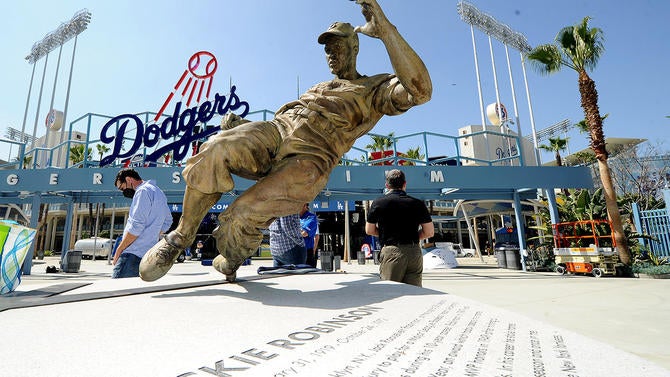
July 24 saw Robinson end a shutout when he hit an eighth-inning home run off a Eugene Bremer curveball (a notable development given the extent to which Robinson struggled when confronted by the breaking balls of teammates early in the spring). He did so moments after ripping a similar Bremer offering deep but just on the foul side of the pole. His was one of just two home runs that Bremer allowed in 1945, en route to pitching to a 2.25 ERA for the season.
Near the end of July, Robinson was selected to participate in the East-West All-Star Game in Chicago. He went 0 for 5 in the game but played spotless defense at short in the West's 9-6 triumph.
After hosting a pair of military teams for exhibition matches, Robinson and the Monarchs departed for their last East Coast trip of the 1945 season. In a victory over the Homestead Grays in Pittsburgh, Jackson pilfered home on a double steal, just under the tag of Josh Gibson. Days later he went 2 for 3 in a win over the Black Yankees at Yankee Stadium. Aug. 13 -- soon after the U.S. atomic bombing of Japan -- brought the Monarchs to Boston for the first night game in the history of Braves Field. The Monarchs trounced a local Navy team, and Robinson sparkled in the field at shortstop and on the bases with a steal of home and a delayed steal of third. "Jackie proved why he is the talk of the country," wrote Boston Chronicle columnist Sheep Johnson. He then went 2 for 5 in a win over the Bushwicks in Queens and notched a 1-for-3 day against the Grays in Washington.
Near the end of the Negro League regular season, the Pittsburgh Chronicle reported that Robinson intended to coach football in the fall back at Samuel Huston College. He also hinted that he might play football in the Pacific Coast League rather than return to the Monarchs.
On Aug. 24, the Monarchs were in Chicago for a four-game series against the American Giants. In the midst of what would be a sweep at the hands of the Giants, Brooklyn Dodgers scout and coach Clyde Sukeforth -- the lurking white fellow spotted by Robinson's teammates -- approached Robinson at Comiskey Park before the game. Sukeforth adhered to the tale that Branch Rickey was looking to start a team of Black players under the Dodger banner and would like to meet with him. This, of course, may have been but a stalking horse for Rickey's real intentions, which Robinson probably suspected early on. Already laid up with a sore shoulder, he traveled to Toledo to meet Sukeforth on the 26th despite his suspicions. Then they took the train to New York together for what would be Robinson's fabled and secret caucus with Rickey -- the meeting on Montague Street in Brooklyn that would lay the foundation for what was to come.
Robinson emerged from that meeting with a formal agreement to sign a contract with the Montreal Royals, the Dodgers' top minor-league affiliate, for the 1946 season and to do so by Nov. 1. Rickey swore him to silence and said he could tell only his family and his fiancée Rachel Isum about their accord.
Robinson then returned to the Monarchs, who were set to begin a post-regular season round of barnstorming. According to Robinson, he proposed playing in those exhibitions through Sept. 21, at which point he would return home to Pasadena for some sorely needed rest and recuperation. The Monarchs, however, refused and told Robinson he would play the full exhibition schedule or play no games at all. Robinson chose the latter and went home.
According to Baseball-Reference.com, Robinson concluded his lone season in the Negro Leagues with a batting line of .375 AVG/.449 OBP/.600 SLG (208 OPS+), and his OPS of 1.049 paced the Monarchs by a wide margin. Furthermore, Baseball-Reference credits Robinson with league-leading tallies in home runs (four), doubles (13), and total bases (72). Robinson also paced the Negro American League with his .449 OBP.
For reasons already noted -- i.e., his extended respite from the game and the Monarchs' grueling travel demands — Robinson's numbers become even more towering when full context is applied. There was also another force working against him in Kansas City, and that was Robinson's mounting unhappiness -- unhappiness that would cling to him even after his Monarchs days were over.
Rickey, meantime, proceeded with his closely guarded plans. Word of their meeting leaked out to some segments of the Black sporting press, but otherwise Rickey succeeded in concealing the true purpose of his summoning Robinson to Brooklyn. In anticipation of the announcement of Robinson's signing and out of desire to control the message, Rickey hired New York sportswriter and confidant Arthur Mann (who supposedly could do a spot-on Rickey impression) to pen a carefully supervised retelling of what led up to the moment that would surely shake the assumptions of American society. In October, Rickey arranged for Robinson to travel to nearby San Diego for a photo shoot with two other Black players. Those photos were to accompany Mann's chronicle, which would run as an exclusive to Look magazine at the same time as the Dodgers' announcement.
Mann's article, which bordered on agitprop, was a sprawling mess peppered with mythmaking, errors of fact, and Rickey's unrelenting complaints about how the Negro Leagues did business. It does, however, contain this passage, which is remarkable in retrospect:
"Determined not to be charged with merely nibbling at the problem, Rickey went out and brought in two more Negro players, Donald Newcombe, of Newark, a pitcher; and Sam Jethroe, of Cleveland, an outfielder. He consigned them, with Robinson, to the Dodgers' top farm club, the Montreal Royals, current International League champions, and back door to Ebbets Field. While they may not make the big-league grade in 1946 or even at all, they will have every chance to do so, and Rickey has hopes of seeing one or all three in a Dodger uniform next summer."
According to Mann's article, which again was written in close consultation with Rickey, Rickey had plans to sign other Negro League stars at the same time, or very close to the same time, as Robinson. As we know, however, that didn't happen, and municipal politics appears to be the reason.
Rickey learned that a clarion call to break the major-league color line would be a part of the New York City mayoral race in November, and Rickey, perhaps not wanting to share the moment with politicians and see his legacy become a shared one, changed tack. On Oct. 7, Rickey wrote to Mann, "There is more involved in the situation than I had contemplated."
More from that same letter:
"There is a Nov. 1 deadline on Robinson, -- you know that. I am undertaking to extend that date until Jan. 1 so as to give me time to sign plenty of players and make one break on the complete story. Also, quite obviously it might not be good to sign Robinson with other and possibly better players unsigned."
Less than two weeks later, though, the Montreal Royals announced the signing of Robinson and Robinson alone. In the end, Rickey, despite his careful orchestrations, proved unable to control every last circumstance and determined he had no choice but to move forward before he wanted to and with Robinson as the lonesome standard-bearer.
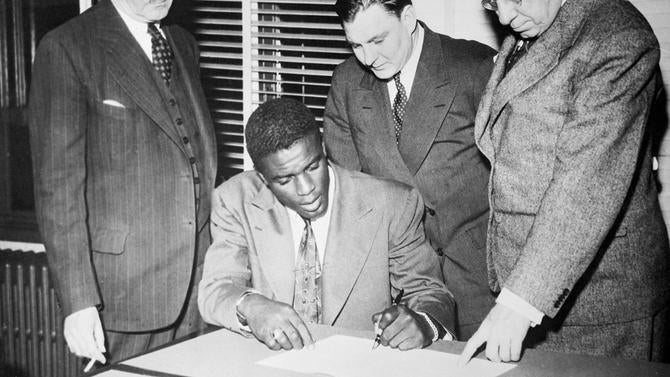
It's not entirely clear why the accelerated timeline prevented Rickey from signing Newcombe and Jethroe at that time. He would eventually sign both but not right away. This meant the breaking of the color line would be a solitary endeavor for Robinson and surely more personally burdensome for him. That said, Robinson was at the forefront of a modest influx of Black players into the theretofore white major and minor leagues in 1947, when he first made it to Brooklyn. On July 5 of '47, Cleveland owner Bill Veeck announced the signing of outfielder Larry Doby, the first Black player ever in the American League (an American League that was, it should be noted, probably even more hostile to integration than the National League was). Less than two weeks later, Hank Thompson suited up for the St. Louis Browns. Aging slugger Willard Brown joined him in St. Louis soon after, and he and Thompson became the first Black teammates to appear in the same MLB lineup. (Thompson would earn the distinction of breaking the color line for two different teams -- the Browns and in 1949 the Giants.) In late August of that year, right-hander Dan Bankhead became Robinson's teammate with the Dodgers.
On other fronts, Rickey's machinations in late 1945 raised the ire of not only the Monarchs but also the entire cohort of Negro League team owners. Rickey in signing Robinson dealt only with the player himself and not with the club that employed him. His justification was that the Negro Leagues lacked uniform player contracts and thus he was under no obligation to purchase Robinson's rights from the Monarchs -- he viewed Negro League players as being free agents each offseason. Tom Baird, a minority owner of the Monarchs, threatened legal action, but those efforts came to grief.
In the end, Rickey had Monarchs principal owner J.L. Wilkinson in an unenviable negotiating position from the start for reasons beyond the latter's control. "J.L. Wilkinson was a white man," explains Bob Kendrick, president of the Negro League Museum in Kansas City. "If this white man who made his living in Black baseball, if he blocked what every Black person in America wanted, that just wouldn't fly."
Wilkinson acquiesced, and Robinson in 1946 began his career in the Dodgers organization. With the Montreal Royals in '46, Robinson put up exceptional numbers across 124 games and helped pace the Royals to a record of 100-54 and a triumph in the Junior World Series. That in tandem with his success with the Monarchs augured well for Robinson, and as a major-league debutante in 1947 he indeed delivered. In 151 games for Brooklyn, the 28-year-old rookie batted .297/.383/.427 with 12 home runs, an NL-leading 29 stolen bases, and more than twice as many walks as strikeouts. He did it all while manning the premium position of second base and facing inhuman hostilities and pressures that overwhelm any attempt at describing them.
Even with that foundation for success in the majors, Robinson did not reflect fondly upon his time in the Negro Leagues. In an essay titled. "Jackie Robinson and the Decline of the Negro Leagues," Nathan Bierma writes that Robinson in Kansas City "quickly soured on the experience. He was surprised by the lack of formal contracts, the lack of consistency and professionalism in umpiring and scorekeeping, the poor quality of buses and accommodations, and the drinking and late-night partying of his teammates."
These antipathies didn't lessen after Robinson integrated MLB. Indeed in early 1948, Robinson, while in Georgia as part of a vaudeville tour, told the Atlanta Daily World that "Negro baseball needs a housecleaning from top to bottom."
He was far from done. Robinson then penned a piece titled "What's wrong with Negro Baseball?" for the June edition of Ebony magazine. By that point, Robinson was well into his second season with Brooklyn, and it may have struck some as odd that he chose to revisit grievances from three years prior. Robinson in the piece trenchantly criticized the Negro American League for, among other things, the low wages paid. To hear Robinson tell it, his $100-per-week salary was slightly above average for the loop, and on top of that each player's $2-a-day meal allowance for road trips was deducted from his monthly earnings. Robinson called out all the miles of travel on uncomfortable buses and the string of beneath-code motel rooms with unusable bathrooms. Also nettling him was what he perceived as the lack of accountability placed upon players for their off-field behavior -- behavior that in Robinson's estimation compromised their on-field performances. "With the Monarchs I found the rules as far as players were so lax that on many days some of the players would not get to bed at all," Robinson wrote. "They were allowed to drink whenever they pleased. Naturally, this would not give the fans the benefit of seeing the best ball."
Notably, Robinson also pushed back against the widespread notion that Rickey and the Dodgers pilfered him from the Monarchs. "Leaving Kansas City was done on my own volition," Robinson attested in the pages of Ebony, "and I would have done so whether I could have played elsewhere or not."
Given Robinson's litany of very specific criticisms aimed at the Monarchs, it's easy to take him at his word. Doubtless he was something of a poor fit for the league in terms of his preference for regimentation and careful order, to say nothing of his teetotaling and religiosity. However, Robinson in his provocative Ebony piece betrays a lack of empathy regarding the economic barriers facing the Negro Leagues, particularly during the war years. Yes, the league's labor structure was unrewarding for players and personally grueling, but those far-flung barnstorming games were essential to each team's financial survival. Moreover, Negro League clubs rarely controlled their own playing venues and were thus often forced to rent ballpark time from major-league teams, often at crippling rates. The New York Yankees, for instance, benefitted handsomely from this arrangement, and it's not hard to see how such arrangements created perverse incentives for major-league franchises to maintain the color line.
On occasion, scheduled Negro League games at those major-league stadiums would be cancelled at a moment's notice because of, say, a prize fight that materialized suddenly and promised a more abundant gate. "Booking agents" also exerted undue control over the process of scheduling Negro League games and were able to extract a 40 percent share of gameday receipts for their (relatively modest) troubles. If Negro League team owners raised any kind of stink over such treatment, then agents such as Abe Saperstein and Eddie Gottlieb would retaliate by freezing their teams out of the most lucrative venues. For those and many other reasons, even the flagship Negro League franchises likely operated on the thinnest of margins.
The rejoinder to Robinson's Ebony piece, decidedly of the withering variety, came from the fiery-by-necessity Effa Manley, the long-time operator and eventual owner of the Negro Leagues' Newark Eagles franchise (and presently the only woman in the Baseball Hall of Fame). Soon after Robinson's criticisms came out, Manley released a statement in response. It read in part:
"I charge Jackie Robinson with being ungrateful. He is where he is today because of organized Negro baseball. I believe that he never would have been noticed if it were not for the people and the teams he derides."
The above may have even been a somewhat sanitized rendering, as others have Manley referring to Robinson as "ungrateful and more likely stupid." Manley went on to parry some of Robinson's specific objections, and then took aim, at least by implication, at Rickey, whose motivations Robinson had praised within the pages of Ebony as being "purely democratic in nature."
Manley played an essential role in the integration of the American League when she sold Larry Doby's rights to Cleveland for a reported figure of $15,000. This was in contrast to how Rickey made Robinson a part of the Dodger organization -- i.e., he did so without compensating the Monarchs -- which Manley and other Negro League owners understandably viewed as a dangerous assault upon their tenuous business. Manley disputed Robinson's and Rickey's claim (more "tidy rationale" in Rickey's case) that the Negro Leagues operated without enforceable contracts. "We have contracts in our league despite what he [Robinson] says about a letter memorandum by which he was hired. Even in business letter memorandums are often used." Or, as Tom Baird told the Sporting News at the time, "Robinson was signed by letter and telegrams."
Manley had no doubt been soured by her previous dealings with Rickey. Weeks after the Robinson signing, Rickey and the Dodgers inked the young right-hander Newcombe away from Manley's team without compensation. As well, around that same time Rickey approached the richly accomplished Monte Irvin about signing and reporting directly to Brooklyn for the 1946 season. That would've made Irvin and not Robinson the first Black player in modern Major League Baseball. Irvin was hesitant because he'd been away from baseball for three years while serving in World War II, and his opportunity vanished when Rickey refused to compensate Manley for Irvin's rights. Irvin would make his way to the majors in 1949 as a member of the Giants and would eventually be elected to the Baseball Hall of Fame.
Manley at the time of her response to Robinson was perhaps especially defensive of her league given the way events had conspired to undermine it. The ascension of Robinson to Brooklyn was the loudest of death knells for the Negro Leagues, but adding to the strife of 1947 was the loss of a pair of luminaries and the league's strongest draws. Slugger Josh Gibson died of an apparent stroke at the age of 35 in January, and later in the year legendary moundsman Satchel Paige left the Monarchs to pursue other baseball opportunities -- including, in 1948, a spot with the Indians. This is to say nothing of the still-damaging reverberations of World War II. Months after Manley issued her statement, she disbanded and sold her Newark Eagles, and the Negro National League folded.
Given Robinson's experiences with surely lusher accommodations and means of travel with UCLA and then the Dodgers, his broadsides directed at the Monarchs and the Negro Leagues weren't all that surprising. Neither were his occasional frustrations with his teammates -- teammates who came to view him as aloof and judgmental -- in light of Robinson's personal rectitude and at times single-minded determination. It follows, then, that Robinson at various points during the 1945 season had threatened to leave the team, and on one of those occasions Hilton Smith, the pitcher who may have been responsible for Robinson's presence on the team, had to persuade him not to head back home to California. Similarly, it follows that Robinson would have written those words in Ebony, just as it follows that Robinson in his 1972 autobiography, published in the year of his death, would refer to the Negro Leagues as "a pretty miserable way to make a buck."
And perhaps it was for him. Manley, though, may have been right when she said he likely would never have drawn the attention of Rickey had the Negro Leagues not provided the means for his five-month audition. Bob Kendrick agrees. "Effa Manley is absolutely right," he tells CBS Sports. "If it's not for the Negro Leagues, we don't get Jackie Robinson. For whatever his consternations he had about the league, it was the Monarchs who gave him the opportunity to be seen."
However, John Thorn, the official historian for MLB, takes a different perspective. "Effa Manley's view that Jackie Robinson benefited from his time in the Negro Leagues is correct, but I think Rickey might have chosen him anyway, even based only on his UCLA experience," Thorn tells CBS Sports via direct message. "... Rickey knew that Robinson was a great multisport athlete and the fact he had attended college was a big plus for him, even though he knew that the Negro Leagues offered players more skilled than Robinson."
Wherever the unknowable truth lies, the Negro Leagues were Robinson's ingress into affiliated baseball and eventually the major leagues. Whether his time with the Monarchs was essential or "merely" important probably matters less than a simple respect for his path as it was. For that path, regardless of where it meandered and whether it could have been different, was in the service of history, greatness, and unreserved heroism.
Notes on sources: Particularly important to this piece was Aaron Stilley's wonderfully thorough site Jackie with the Monarchs. His dedicated research therein provided a valuable glimpse of Robinson's day-to-day life in the Negro Leagues. Also, thanks to Bob Kendrick, John Thorn, and Scott Simkus for their willingness to share their wisdom.
Complete sources: Baseball-Reference.com; BaseballHall.org; Baseball's Great Experiment by Jules Tygiel; Crossing the Line: Black Major Leaguers, 1947-1959 by Larry Moffi and Jonathan Kronstadt; "Hall of Famer Monte Irvin Dies," by Vincent Lara-Cinisomo, Baseball America; Jackie: Perspectives on 42, edited by Bill Nowlin and Glen Sparks; Jackie Robinson: My Own Story by Jackie Robinson and Wendell Smith; The Jackie Robinson Reader, edited by Jules Tygiel; "Jackie Robinson's Signing: The Real Story" by John Thorn and Jules Tygiel, OurGame.MLBlogs.com; I Never Had It Made by Jackie Robinson; jwtm1945.blogspot.com; Invisible Men: Life in Baseball's Negro Leagues by Donn Rogosin; J.L. Wilkinson and the Kansas City Monarchs: Trailblazers in Black Baseball by William A. Young; Kansas City Call archives; "Mrs. Effa Manley Says Eagles Got $15,000 For Doby," The Morning Call, May 22, 1948; Outsider Baseball by Scott Simkus; SABR.org; Shades of Glory by Lawrence D. Hogan; "Tryout and fallout: Race, Jackie Robinson and the Red Sox," by Glenn Stout, Massachusetts Historical Review (Volume 6, 2004); "What's wrong with Negro Baseball?" by Jackie Robinson, Ebony magazine (June 1948)
















